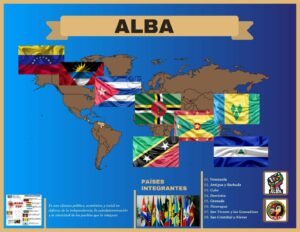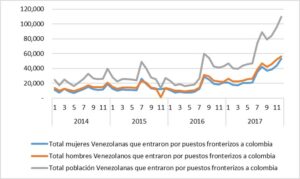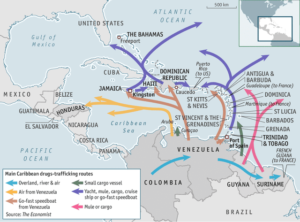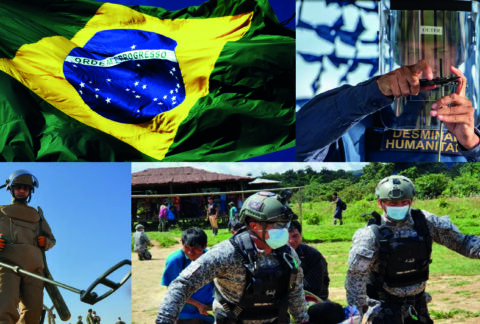Summary:
This article presents the most updated information on the impact of the COVID19 pandemic on the commercial, political and military hegemony that Colombia exercises in the sub-region of the ALBA Countries. For this purpose, a qualitative method was used to describe the way in which this pandemic is affecting Colombia and the ALBA-TCP (Bolivarian Alliance for the Peoples of Our America – Peoples’ Trade Treaty) region. To this end, three thematic axes were defined. The first one identifies the factors affecting Colombia in its geopolitical relationship with the ALBA countries. On the other hand, the second thematic axis describes the economic, commercial, political and military impact of the COVID 19 pandemic in Colombia and the subregion of the ALBA countries. And finally, in the third thematic axis, we present some aspects of the economic, commercial, political and military hegemony of Colombia in the subregion of the ALBA countries within the framework of this COVID 19 pandemic. At the time of writing this article, Latin America has become the most affected region in the world and Colombia is beginning to enter its peak of infected and deaths. This vertiginous dynamic of events is just the beginning of a great historical juncture that can make changes in the world order. The importance of this article is to present updated and important information, which will serve as a substrate for future research that will allow a larger and more definitive analysis, which can only be consolidated when the world overcomes this great challenge and whose temporality nobody knows, taking into account the emergence of new outbreaks in Asia and Europe.
Key words. COVID 19, Latin America, ALBA countries, Colombia, Economic impact. Hegemony.
INTRODUCTION
The COVID-19 pandemic is a threat to the survival of the human species and is also a global challenge, which requires the rupture and study of many paradigms, becoming a wave with surrealist dyes that hits our region. At the Latin American level, it is of vital importance to identify its impact on social, economic, commercial and political aspects, and above all it is essential to know the behavior that the pandemic has generated in the sub-region of the ALBA-TCP countries, since, at the geopolitical and geostrategic level, many factors of the countries that compose it are a challenge to our national security. According to Barría, 2020: “Nobody knows exactly what effects the COVID-19 crisis will have on the economy and its direct effect on health systems and mortality rates, and indirect effects, which will materialize on the supply and demand side of the economy”. The above without knowing the importance of Brazil in the geopolitical stability of the region as an emerging power, but in this study we focus on the ALBA region because of its influence in the Caribbean Sea, because its integration has an ideological base of Castro Chavismo, and due to its social and cultural diversity, the ALBA-TCP presents a set of elements that may affect the interests of the Colombian nation.
With respect to Colombia, in addition to the socioeconomic challenges, there is the problem associated with the implementation of the Peace Agreement with the Revolutionary Armed Forces of Colombia (FARC). During the quarantine period, nine social leaders have already been assassinated, and their lack of protection has increased as a result of social confinement. In this regard, even Amnesty International has denounced the limited protection schemes for many people. In addition, the security situation has worsened due to the fact that multiple armed and criminal groups have expanded their activities, taking advantage of the fact that the Army is attending to the social and health emergency. Added to this is the pressure exerted by the United States government on the national government, which emphasizes the maintenance of force measures against the production of alkaloids, therefore, the forced eradication of illicit crops ordered by the government and executed by our Military and Police Forces, has somehow increased the vulnerability of peasant families in our country. (Carolina Foundation, 2020).
However, in the region our country exceeds expectations and although its economy has been impacted, the measures adopted by the government have been correct and in some way or another have mitigated the nation’s interests in a favorable way in relation to other countries in the region. Among the countries that will face the worst economic position in the region is Venezuela, since it does not have sufficient economic reserves and it is impossible for it not to collapse economically. The second most affected would be Ecuador because it was already in serious economic problems, and lastly Argentina follows, these will probably be the most affected economically because of their pre-existing conditions (Galindo, 2020).
Currently, the COVID 19 pandemic has Latin America as the most affected region in the world. In Colombia, as in other regions, its effects are already beginning to be felt, as is the case of the economic slowdown, however, the measures taken by the national government have allowed the epidemiological curve to have a flattening trend, which for a large majority of Colombians has been taken as a successful strategy that together with the mitigation measures have allowed the health system not to collapse, encouraging the slow and gradual reactivation of the national economy.
All these data will be useful as a source for future studies that will allow a deeper analysis of this historical juncture, not only for Colombia and the ALBA- TCP countries, but also worldwide.
METHODOLOGY
This article presents a qualitative, descriptive approach in which the most updated information on the impact of the COVID 19 pandemic in Colombia and the ALBA-TCP countries is reviewed, providing important data to identify the main factors that may influence the economic, political and military stability of our region.
Factors affecting Colombia in its geopolitical relationship with the ALBA countries:
Colombia’s geopolitical panorama was witnessing the strengthening of Castro Chavismo two decades ago. On December 14, 2004 in Havana, Cuba, the first summit was held, where the presidents of Cuba and Venezuela signed the Joint Declaration for the creation and the Agreement for the implementation of ALBA-TCP (Bolivarian Alliance for the Peoples of Our America-People’s Trade Treaty). At subsequent summits, Bolivia, Nicaragua, Honduras, Commonwealth of Dominica, Ecuador, St. Vincent and the Grenadines and Antigua and Barbuda joined (Vicentes, 2010). ALBA-TCP was created as an alternative to the FTAA (Free Trade Area of the Americas), which was proposed by the United States at the Miami Summit in 1994. ALBA’s ideology is socialist, and is opposed to neoliberalism and globalization. According to Vicentes (2010):
The United States through the implementation of the FTAA sought to expand its markets and increase its consolidation and development reaffirming its hegemony in the continent after the fall of the communist model and the end of the cold war. The opening of markets allowed it to have control over the continent, which was reflected in a somewhat asymmetrical interdependence, since it was precisely the United States that would set the rules due to its development vis-à-vis the rest of the Latin American and Caribbean partners”. (p.10)
The political and regional security cooperation of the ALBA-TCP countries arises from the need to solve the security and defense problems suffered by the region, such as possible incursions of the United States or its allies in ALBA countries, terrorism, drug trafficking and border security, asymmetric warfare, among others, which are due to an imperialist influence in the world order affecting the region and which are faced by means of an orientation towards the promotion of peace, understanding, Latin American integration and justice (Vicentes, 2010). However, with the political shift to the right in Brazil, Bolivia and Ecuador, the leftist panorama in the region began to fade in recent years. In the current conformation of ALBA-TCP, the absence of Bolivia and Ecuador stands out (see Table 1).
Table 1. ALBA-TCP member countries

In order to understand the factors affecting our country, as a result of its geopolitical relationship with the ALBA countries, it is necessary to analyze the importance and recommendations issued by ECLAC, in which suggestions are made regarding the approach to the social emergency, for which it is necessary to take income protection measures for the most vulnerable groups, employment protection measures, such as unemployment benefits and basic emergency income, and measures to support small and medium-sized enterprises (SMEs) and self-employed workers (Economic Commission for Latin America and the Caribbean [ECLAC], 2020).
The Venezuelan diaspora, i.e. mass emigration, due to the economic crisis is a factor that greatly affects Colombia (See Figure 1). The migration of Venezuelans to Colombia increases the vulnerability that the migrant population has in terms of public services, health, employment and other guarantees that raise minimum living conditions, obviously this also generates an impact for the population of the receiving country (Colombia) and transit, because public spending must be distributed in a greater number of people (Franco and Suaza, 2019).

Political instability in Venezuela affects border security and increases transnational crimes, of which drug trafficking plays an important destabilizing role. According to Christian Vianna de Azevedo (2019), a researcher at the Center for Studies on Transnational Organized Crime in La Plata, Argentina:
The border region between Colombia and Venezuela is currently one of the hotspots for organized crime in Latin America. The economy generated by illicit enterprises moves millions of dollars a month in this region and favors the permanence and expansion of various criminal organizations. Drug trafficking in Colombia was led by the GAO and guerrilla groups. The FARC played a prominent role in the Colombian drug market, although the peace process made it possible for the GAO to take over some of their routes. However, on the Colombia-Venezuela border, the ELN and ex-FARC guerrillas maintain a certain preeminence thanks to their strong relationship with both Chavez and Nicolas Maduro, in addition to their close relationship with the Cartel of the Suns. (p.2-3).
These new drug trafficking routes were established from Venezuela to Central America through the Caribbean, due to U.S. pressure in the northern part of Colombia. These routes worsen the social crisis in all countries involved in cocaine trafficking, from its production, transport and consumption (See Figure 2).

Diplomatic relations between Nicaragua and Colombia are not the best, due to their dispute over the San Andres and Providencia Islands. Nicaragua does not recognize the Esguerra treaty. For its part, Colombia does not recognize the ruling of the International Court of The Hague that favors Nicaragua regarding the continental shelf full of marine resources. No one defines it better than Alvarado, (2014), when he states:
Perhaps it was premonitory what was said in 1930 by the representative to the chamber of Nicaragua, García Largaespada, who in relation to the (sic) territorial conflict with Colombia during the period of debates on the signing of the Esguerra-Bárcenas Treaty, said: “The territorial issue with Colombia can only be solved in three ways: First: By direct settlement between the two countries, as does the treaty we know, second: By arbitration; and Third: By war”. We will only know how nearly two hundred years of conflict over territory and borders will end as events continue to unfold and this confrontation continues to unfold (p.267). (p.267).
In Colombia, 47% of workers are in the informal sector, that is, 5.7 million people. Also, a quarter of the population works in micro-businesses, 7 out of 10 workers do not contribute to health, according to a study conducted by the Universidad de los Andes (Fundación Carolina, 2020). On the other hand, the multidimensional poverty rate in Colombia is 19.6%, and monetary poverty is 27%, being especially intense in departments such as Guainía with 65%; Guajira with 51.4%; or Chocó with 45.1%. Added to this is the enormous social inequality and inequality in the capacities of the State in the different territories (FEDESARROLLO, 2020). In addition to the socioeconomic challenges, there are problems associated with the implementation of the Peace Agreement with the Revolutionary Armed Forces of Colombia (FARC). Added to the pressure exerted by the U.S. government to maintain the measures of force against the production of alkaloids, therefore, the forced eradication of illicit crops ordered by the government and executed by our Military and Police Forces, has somehow increased the vulnerability of peasant families in our country. (Carolina Foundation, 2020).
In this order of ideas, the ALBA-TCP countries were integrated against the power exercised by the United States in the region. For its part, Colombia is integrated into the FTAA (Free Trade Area of the Americas), becoming a strategic ally of the giant of the North as opposed to the integration process of Castro Chavism. However, serious problems of social inequality, corruption and drug trafficking persist on both sides, and until they are solved, there will be no real progress, regardless of the dominant political regime or the type of economic system in place.
ALBA-TCP has not shown much progress as an experiment in regional integration. Mainly due to the authoritarian scheme imposed by the Venezuelan regime, the international blockade of its economy, and the crisis of governance and leadership, despite its immense reserves of natural resources.
Broadly speaking, these were the factors and the geopolitical scenario affecting Colombia’s relationship with the ALBA-TCP countries in the moments prior to the global cataclysm caused by an unknown virus originating in Wuhan, China.
The economic, commercial, political and military impact of the COVID 19 pandemic in Colombia and the sub-region of the ALBA countries.
The evolution of the coronavirus pandemic in Central and South America, in a few weeks marked an accelerated pace of contagions, generating an important impact on the geopolitics of the region to which Colombia has not been the exception, the coronavirus crisis has arrived in the midst of great socio-political instability, after the massive protests against the government in November and December 2019 (Federación Nacional de Desarrollo [FEDESARROLLO],2020). Added to this are the poor economic prospects for 2020 as a result of the drop in oil prices and the regional economic slowdown and the reality of structural inequality (Barría, 2020), added to which, perhaps the greatest challenge among these additional challenges, is the management of Venezuelan migration that may cause the pandemic to have an even more disproportionate impact on some social sectors (Barría, 2020).
According to Barría, 2020: “this pandemic has the potential to transform the geopolitics of globalization”, but it is also an opportunity to highlight the benefits of multilateral actions and open space for the necessary debate on a new, sustainable and egalitarian development model (ECLAC, 2020). It is clear that the region needs greater productive, commercial and technological integration to influence the new international economic geography where industrial and technological policies can be generated that favor the creation and strengthening of productive capacities and boost productivity, employment and sustainable growth (ECLAC, 2020). According to ECLAC, to address the social emergency it is necessary to take income protection measures for the most vulnerable groups, employment protection measures, such as unemployment benefits and basic emergency income, and measures to support small and medium-sized enterprises (SMEs) and self-employed workers (ECLAC, 2020).
However, Colombia has exceeded the expected expectations and although its economy has been impacted, the measures adopted by the government have been successful and in some way or another have mitigated the interests of the nation in a favorable way in relation to other countries in the region (Galindo, 2020), according to economists among the countries that will face the worst economic position in the region is Venezuela, it does not have sufficient economic reserves and it is impossible that it does not collapse economically. The second most affected would be Ecuador because it was already in serious economic problems, and finally Argentina, these will probably be the most affected economically because of their pre-existing conditions. However, it is possible that no Latin American country will escape a gigantic economic and social crisis (Barría, 2020).
The only exception is Guyana because of its recently discovered gigantic oil reserves. Even with low oil prices it will probably have some level of growth (Barría, 2020).
According to estimates by the United Nations Economic Commission for Latin America and the Caribbean the pandemic will generate in the region the largest recession the region has ever suffered, with an estimated contraction of -5.3% in 2020, a plunge in trade by -15%, and increases in unemployment, poverty and inequality (ECLAC, 2019).
Therefore, the economic, commercial, political and military impact on Colombia and the subregion of the Alba countries is mediated by direct and indirect effects, among the direct effects is the impact exerted on the health systems of the region, whose infrastructure becomes insufficient to face the problems generated by the pandemic. Military spending in Latin America will be affected by the reduction in gross domestic product (GDP) and by the effort required to rebuild the economy worldwide. Most countries in the region are characterized by weak and fragmented health systems, with little wealth in infrastructure and technology (Barría, 2020), which do not guarantee the universal access needed to face the COVID-19 health crisis. It should be noted that the countries of the region spend an average of 2.2% of GDP on health; therefore, it is essential to find fiscal space to strengthen health systems (ECLAC, 2020).
Among the indirect effects of the crisis unleashed by the pandemic in the region, we can distinguish six external channels of transmission: 1) The decline in the economic activity of its main trading partners and its effects; 2) The fall in the prices of primary products; 3) The interruption of global value chains; 4) The lower demand for tourism services; 5) The reduction in remittances; and 6) The intensification of risk aversion and the worsening of global financial conditions (Barría, 2020).
In the domestic area, containment measures will have costs in production (up to 67% of regional GDP) and employment (up to 64% of formal employment). Likewise, prevention and containment measures deepen the care crisis in the region (Institute of International Finance [IFF], 2020).
According to ECLAC, prior to COVID-19, Latin America and the Caribbean already showed low growth, was the region with the worst economic performance and was even in the intensive care unit before the pandemic arrived, limited in monetary and fiscal space and with ostensibly increasing levels of poverty and inequality (ECLAC, 2020). Clearly, at this time, no country’s priority is to contain public debt, which in the case of Colombia is around 59% of GDP. The priority lies in stimulating the economy through public spending and injecting liquidity into the system. However, the indebtedness and the economic reconstruction measures that will be needed afterwards imply assuming that part of the burden will have to be borne by the next generations (PORTAFOLIO, 2020).
The COVID 19 pandemic affects Colombia’s economic, commercial, political and military hegemony in the subregion of the ALBA countries.
Colombia is located in the geostrategic maritime region dominated by the United States, therefore, its geopolitical interests are oriented to 3 regions. Western Pacific, Caribbean and South America. As Colombia is the largest state in the Caribbean region, it must act as a medium-sized power to dissuade expansionist initiatives by other states. Colombian leaders must assume that geopolitical power projection is a necessity to avoid losses of territory or challenges to the exercise of state power (Esquivel, 2015). Therefore, Colombia is in the possibility of projecting itself in the ALBA-TCP region to protect its interests, but this depends on the magnitude of the slowdown in the economy and the increase in the health crisis.
According to the ECLAC study, the value of exports from the region is expected to fall by at least 10.7% in 2020, due to lower prices and a contraction in global aggregate demand (ECLAC, 2019). Moreover, as the spread of the virus has accelerated the use of internet and digital technologies, this increase may exacerbate inequalities arising from different access to them between countries (Brazil Internet Steering Committee, 2019) and among lower income groups which increases the risk of political instability in many Latin American countries (Barría, 2020).
Meanwhile, addressing the economic emergency requires actions in fiscal policy, monetary policy and international cooperation. In the fiscal area, budgets must be reorganized to implement fiscal stimulus packages to strengthen health systems, protect revenues and minimize the contraction of the economy. In the monetary area, efforts must be made to stabilize exchange rates and preserve the solvency and functioning of the banking market (European Foundation for the Improvement of Living and Working Conditions, 2019). And to incentivize international cooperation, it is necessary to reconsider the concessional lending and graduation policies of international agencies. Also facilitate low-interest loans and postpone debt service to developing countries (FEDESARROLLO, 2020).
The pandemic in general has affected the world order, and the geopolitical and geostrategic situation of Colombia will also depend on the reigning multipolarity, and depending on how the great powers respond to this great challenge, so will be the future of the nation. For now, there is no one better to describe the situation in Latin America than Andrián, L., Deza M. and Hirs, J. (2020), of the Inter-American Development Bank, who state:
The shock caused by Covid – 19 is generating adverse effects that do not recognize recent precedents in world economic activity. In order to mitigate these impacts on the economy and the health of the population, the governments of the Andean region have implemented a series of fiscal and other measures. The response capacity has depended on the initial fiscal situation of the countries. This series of measures, together with the decrease in tax collection due to the slowdown in economic activity, will have an impact on public finances. With all this, it is projected that in 2020 the Andean countries will have fiscal deficits close to double digits, gross financing needs close to or higher is 10% of GDP, and debt ratios that will rise between 7 and 15 percentage points with respect to the close of 2019. Once the harmful effects of the pandemic on the health of the population have been brought under control, in the medium term, a series of tax and spending measures are proposed that governments could implement to support fiscal consolidation, adapting them to the needs and conditions of each country. Such measures will have to be carefully designed so as not to compromise the recovery of the economy and to avoid regressive biases. (p.1)
The world will have to accept the fact that globalization has not worked as it was supposed to when this crisis ends. Work must be done to regulate and contain the misalignment of financial markets and the economy in general. We must continue with the sophistication of industry. If inequality between countries and social groups is not solved, the fragility of the global system will increase (ECLAC, 2020, COVID 19 Special Report No 1).
Conclusions:
The geopolitical panorama of Colombia witnessed the strengthening of Castro-Chavism two decades ago, observing how the political and regional security cooperation of the ALBA-TCP countries, arises having as a basis the need to solve the security and defense problems suffered by the region before eventual incursions of the United States or its allies in the ALBA countries, due to terrorism, drug trafficking and border security, asymmetric warfare. However, with the strengthening of the Castro-Chavez policy, geopolitical relations with the ALBA countries deteriorated even more due to political instability in Venezuela, drug trafficking and immigration.
In addition to the maritime disputes with Nicaragua and the growing incursion of communism as predominant in the politics of the countries of the region. Broadly speaking, these could be the main problems affecting Colombia’s relationship with the ALBA countries. However, we cannot leave behind our own conflicts, the multidimensional poverty increased by the current pandemic, which integrated to the socioeconomic challenges and the problems resulting from the implementation of the Peace Agreement with the Revolutionary Armed Forces of Colombia (FARC), together with the pressure exerted by the U.S. government to maintain the measures of force against the production of alkaloids.
Given this description, the Colombian government faces new challenges in the future, which can only be met with a structured political and economic structure, with firm foundations that generate geostrategic alliances based on international cooperation that will allow it to face both its own challenges and those proposed in the region.
Colombia must project its efforts in strengthening its regional and global integrations in order to prepare and project itself for an adequate reconstruction at the time that the pandemic is overcome. In a globalized world such as the one we live in today, it is necessary to create alliances if we do not want to be left out of the international scenario, since isolation is not the best tool to become competent in the face of the demands of today’s world (Vicentes, 2010)”.
According to Barría, 2020: “this pandemic entails the potential to transform the geopolitics of globalization”, (ECLAC, 2020). According to ECLAC, to address the social emergency it is necessary to take income protection measures for the most vulnerable groups, employment protection measures, such as unemployment benefits and basic emergency income, and measures to support small and medium-sized enterprises (SMEs) and the self-employed (ECLAC, 2020). The priority lies in stimulating the economy through public spending and injecting liquidity into the system. However, indebtedness implies that part of the burden will have to be borne by future generations (PORTAFOLIO, 2020).
Colombia’s military spending and that of the ALBA countries will decrease due to the effects of the pandemic on the economy; therefore, the probability of the establishment of armed conflicts tends to decrease.
The economic, political and military impact of the COVID 19 pandemic, despite its ravages on the economy, has not diminished the hegemony that Colombia exercises in the ALBA-TCP region, as a middle power in alliance with the international policy of the United States.
This article describes valuable data that will allow structuring definitive studies on this novel topic, when the world overcomes this historical juncture.
References:
Andrián, L., Deza M. and Hirs, J. (2020): Public finance and the Covid-19 crisis in the Andean countries. Discussion Paper No IDB-DP-0078. Pp. 1-34 Available at https://publications.iadb.org/publications/spanish/document/Las-finanzas-publicas-y-la-crisis-por-COVID-19-en-los-paises-andinos.pdf
Barría, M. (2020). Coronavirus | Interview with Oliver Stuenkel: “This could be the worst economic crisis that Latin America has had in its history”/Cecilia Barría BBC News World/4 May 2020.
ECLAC (Economic Commission for Latin America and the Caribbean), 2020. Informe especial COVID 19 No 1) América Latina y el Caribe ante la pandemia del COVID-19 Efectos económicos y sociales. April 3, 2020. Available at https://www.corteidh.or.cr/tablas/centro- covid/docs/Covid-19/CEPAL-Efectos-economicos-y-sociales-LATAM-S2000264-en.pdf.
ECLAC (Economic Commission for Latin America and the Caribbean) (2020a), “América Latina y el Caribe ante la pandemia del COVID-19: efectos económicos y sociales”, Informe Especial COVID-19, No. 1, April 3, Santiago. (2020b), “Dimensionar los efectos del COVID-19 para pensar en la reactivación”, Informe Especial COVID-19, No. 2, April 21. (2020c), “El desafío social en tiempos del COVID-19”, Informe Especial COVID-19, No. 3, May 12, Santiago.
ECLAC (Economic Commission for Latin America and the Caribbean) (2019), Social Panorama of Latin America, 2019 (LC/PUB.2019/22-P/Rev.1), Santiago.
Brazilian Internet Steering Committee (2019), Pesquisa sobre o uso das Tecnologias de Informação e Comunicação nas escolas brasileiras – TIC Educação 2018, São Paulo.
Turkish Radio and Television Corporation (TPT). Official Website of the Turkish Radio and Television Corporation (TRT). This service contains copyrighted material from Anadolu Agency (AA), Agence France-Presse (AFP), the Associated Press (AP),
Reuters, Deutsche Press Agentur (DPA), ATSH, EFE, MENA, ITAR TASS, XINHUA.
Available at https://www.trt.net.tr/espanol/economia/2020/06/30/turquia-es-definitivamente-el-lugar-mas-adecuado-para-pasar-las-vacaciones-1446248
Franco-López, J. A. & Suaza-Argáez, N. (2019). The Venezuelan diaspora and its impact on the Colombian socioeconomic structure. CEA Journal, 5(10), 83-98. https://doi.org/10.22430/24223182.1204
Esquivel, A. (2015). Colombia’s geopolitical interests. Estudios en Seguridad y Defensa. 2015, June, volume 10, number 19, 71-86.
FEDESARROLLO (2020): “COVID-19: economic costs in health and containment measures for Colombia”, Bogotá. Available at: https://www.repository.fedesarrol- lo.org.co/handle/11445/3920.
Carolina Foundation, 2020. Colombia economic, social and political impact of covid-19. https://doi.org/10.33960/AC_24.
European Foundation for the Improvement of Living and Working Conditions (2019), “European
Reshoring Monitor” [online] https://reshoring.eurofound.europa.eu/. (2020d), COVID-19 pandemic deepens the care crisis in Latin America and the Caribbean, Santiago, April. (2019), Preliminary Overview of the Economies of Latin America and the Caribbean, 2019 (LC/PUB.2019/25-P), Santiago.
Galindo, J. (2020), “People at home are saving Latin America from the worst of the pandemic (for now)”, El País (22/04/2020).
IFF (Institute of International Finance) (2020a), “Global Debt Monitor: COVID-19 lights } a fuse,” April 6 [online] https://www.iif.com/Portals/0/Files/content/Research/Global%20Debt%20Monitor_April2020.pdf. (2020b), “LatAm views: deep recession,” April 13 [online] https://www.iif.com/Portals/0/Files/content/ Research/04_13_2020_latam_views.pdf.
PORTAFOLIO (2020), “Record remittances: in 2019 they exceeded US$8 billion” (12/01/2020). Available at: https://www.portafolio.co/economia/record-en-las-remesas-en-
el-2019-superaron-los-us-8-000-millones-537057.
Vianna, C. (2019): The replacement of Colombian by Venezuelan networks in international border drug trafficking. ARI 37/2019 – April 1, 2019 – Real Instituto Elcano. Pages 1-12
Vicentes, J. (2010): Alianza Bolivariana para los Pueblos de Nuestra América – Tratado de Comercio con los Pueblos “ALBA-TCP” Pontificia Universidad Javeriana. Bogotá 2010 Available at https://repository.javeriana.edu.co/handle/10554/881
Disclaimer: The views and opinions expressed in this article are those of the author. They do not necessarily reflect the official policy or position of any agency of the U.S. government, Diálogo magazine, or its members. This Academia article was machine-translated.









